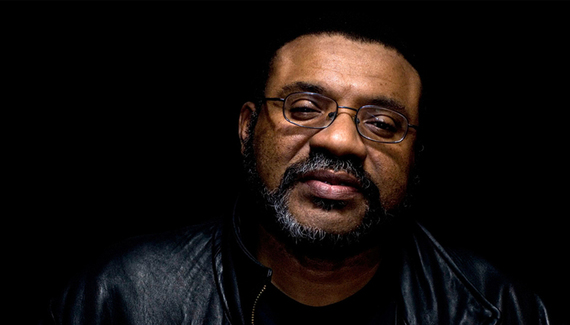(Pictured above: Kwame Dawes)
Kwame Dawes is one of the most consistently thrilling poets at work today. Not only is he prolific but the level of excellence he has maintained over the course of his long career as a poet, editor, educator and tastemaker is impressive. What's gratifying about Dawes' achievements is the graciousness and generosity of spirit that underscores all his work whether he is championing younger poets, editing the prestigious literary magazine Prairie Schooner or praising the joy-inducing "riddims" of reggae music. With Dawes' gorgeous poetry there is a sense of celebration and undiluted pleasure, a feeling that everyone is welcome to the party. When I ask him whether the business of writing poetry calls for solitude and introspection, he corrects me in a succinct and elegant manner:
If poetry demands solitude and introspection, then I am in trouble. I know too many gifted poets who have been waiting for years for time to write. This saddens me. I believe poetry benefits from introspection, but solitude -- physical solitude -- is not necessary for introspection. The secret is to have the capacity for introspection while being around others. I remember hearing Lucille Clifton suggesting to a group of poets that wondered how she managed to keep writing while having her share of children, that they look at the length of her poems during the years she spent raising the kids. They were shorter, she said. Her point was that she was not going to stop writing. But she was going to change the way she wrote -- the form, if you will -- to suit the culture of her world. It is a most brilliant thing. Recently, my children were laughing about the fact that they have never really seen me write. Suddenly there is a book and then they wonder how that happened, when did I do all that writing. The answer is that I worked on the poems while I was with them. Introspection -- thinking, if you will -- happens in the head. Chew, and walk, chew and walk, now rub your belly and pat the head. Again, chew and walk, chew and walk, now rub the belly and pat the head.
Duppy Conqueror, a volume of his selected poems, which includes pieces that date all the way back to his Forward Prize-winning turn in 1994 with Progeny of Air, is a stunning, clear-sighted affair that examines historical wounds and the sense of community, love, friendship and appreciation of art, music and language that arises out of everyday living. There's an electric energy to all these poems and Dawes is, in my opinion, one of the few contemporary writers whose work hits new heights with each new book.
"I do strive for elegance," he says, "because I believe that poetry is about what Marley called "the beauties" -- a quest for the beauty of language used rightly to capture the range of the imagined and the observed and lived. And here beauty may well be decidedly horrific, frightening, and downright ugly. This is the grand alchemy, to use a cliché. At the same time, it is the way we survive, the way that art helps us to survive."
Duppy Conqueror was edited by the poet Matthew Shenoda, who is a long-time friend of Dawes.
We talked a lot about his choices, but I really wanted this to be a book that reflected his vision of my work, which he knows very, very well. The result is a collection that has a wonderful coherence and that reflects as much my preoccupations as it does Matthew Shenoda's and it is the better for it. I was struck by the consistency of my political engagement, my exploration of music, and the manner in which my work seemed to be constantly challenging itself to enter new formal spaces while retaining a peculiar musical integrity. We both agreed that at the heart of the collection (and hence the title), was the reggae aesthetic. I have theorized about this aesthetic, but mostly I have made it clear in my writing that reggae has given me a wonderful framework and permission for poetic flights that have been most rewarding. Duppy Conqueror is the evidence of this.
When asked what he looks for in an emerging poet's work and what gets him excited as an editor and reader, he says:
Poets who are writing into unexplored imaginative spaces excite me. But were I to be honest, I tend to throw myself into the work of poets who read. Poets who engage the wider poetic tradition and have a sense of scale about their place in that tradition are poets I believe who have a great deal of potential. It is possible to read a body of work and start to see what instincts are at work in the poet, line by line. These come from the choices the poet makes, comes from the willingness to go deeper, come from the dogged resistance of cliché of thought and language. And so when poets are writing landscapes (and emotional and mental scapes) that are unique to them or that are part of the world they have emerged from, I get excited because there is going to be something urgent and lively about that effort. My instinct is to want the poet to write as well as he or she can. I am not sure why this excites me and motivates me so much. I want them to be really good, to produce books that they are truly thrilled by and that others recognize for their strong qualities. And so this is what I am looking for. Poets must know the tradition that has formed them whether they like the tradition or not. Poets must have the audacity to imagine themselves unique and the humility to appreciate that this uniqueness is a necessary myth for great art.

